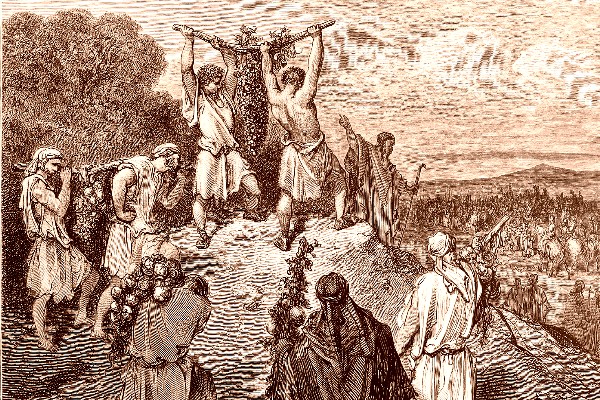How is it possible the men chosen by Moses, who witnessed the miracles of Egypt and the Red Sea, did not have the same unwavering faith as a Canaanite harlot?
By Rabbi Ari Enkin, Rabbinic Director, United with Israel
This week’s Torah portion (in Israel) is “Shlach” (Numbers 13:1-15:41) and it we read about the disastrous episode of the spies.
Moses sent 12 spies, leaders of each tribe, to spy out the Land of Israel in preparation for what was to be the Jewish people’s imminent entry into the Land…their ALIYAH!
Unfortunately, 10 out of the 12 spies returned and delivered a frightening report about the Land and advised against trying to conquer it — even though God said that everything would be alright! The people panicked…they now didn’t want to go the Promised Land. As a result, God punished the people with forty years of wandering the desert, and the rest is history.
The Torah tells us that the 12 spies were all distinct and upstanding people.
Yet, their (the 10 bad ones) problem was that they there were lacking in faith. God said that He would lead the Jewish people into the Land and that they would be victorious in battle in conquering the Land. The spies did not believe that God would pull through. Clearly, they lacked faith in God.
For leaders of the Jewish people, this was nothing less than shocking.
Now let’s fast forward to another very similar episode of spies: the spies that Joshua sent to spy out the land, 40 years later, in preparation for their entry. The story of Joshua’s spies is the weekly teaching from the Prophets this week (just like there is a weekly Torah portion, there is also a weekly Prophets portion!) and it will be read in the synagogue after the Torah on Shabbat morning.
Instead of sending 12 spies, Joshua sent only two. (Point of interest: Joshua was one of the 12 spies that was sent by Moses 40 years earlier. He and Caleb were the “good” spies who told the people that the Land is “very good” and that they would conquer it!).
These two spies made their way into Jericho and stayed in the bed-and-breakfast hotel run by a woman named Rachav. Rachav was not only an innkeeper, but she was also a harlot. As we are about to see, although she was a Gentile woman, working in an immoral profession, she had more faith in God then the leaders of the Jewish people who were sent by Moses.
When Joshua’s spies told Rachav all about the Exodus from Egypt, the Promise of the Land, and the Jewish people’s imminent arrival and conquest, she showed full faith in God and was willing to help the Jewish people at risk to her own life.
How is it possible the men chosen by Moses, who witnessed the miracles of Egypt and the Red Sea, did not have the faith of a Canaanite prostitute?
It is explained that a person should not and cannot be judged by who they are, but rather by where they are going. Great people often fall, and the little guys often reach the top. The one who is working hard, working on himself, and making the effort is in a much better position than the one at the top who becomes lethargic and apathetic. These two individuals will soon be on the opposite sides of the totem pole.
This is the difference between the 10 bad spies, leaders, and Rachav the harlot.
The 10 spies, had reached the top and “let down their guard.” They were immune to the miracles they experienced on a daily basis. They got used to their VIP status. They saw so many miracles that they no longer even distinguished or understood the difference between something natural and something miraculous.
Rachav, on the other hand, was on her way up. She was seeking the truth. She knew the Canaanite religion was useless and bankrupt. She had a close-up with greatness and it ignited her spark. Rachav later converted to Judaism and married Joshua.
And so it is with us.
We can never rest on our accomplishments. We can never let down the guard. We must take nothing in this world for granted. If we do, we are going to sink.
We must always envision ourselves as the Rachav, looking for truth and inspiration wherever it may come. To be a VIP might have its benefits, but loss of focus for such people can be a devastating disaster.
